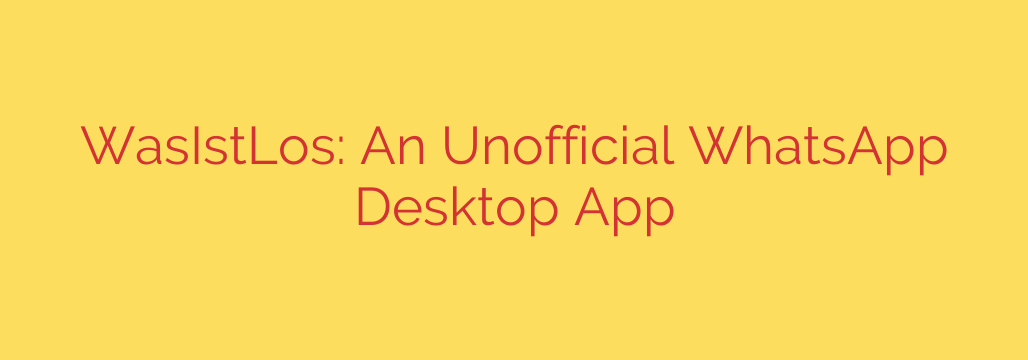
WasIstLos: Understanding the Risks of Unofficial WhatsApp Desktop Apps
WhatsApp has become an indispensable tool for communication for billions worldwide. Its ease of use and cross-platform functionality are undeniable. However, the quest for convenience can sometimes lead users down a risky path – particularly when exploring unofficial desktop applications like WasIstLos.
Unofficial WhatsApp desktop apps, while promising enhanced features or accessibility, often pose significant security and privacy risks. Understanding these risks is crucial for safeguarding your personal information and maintaining the integrity of your WhatsApp account.
One of the primary dangers lies in the potential for malicious code. Unofficial apps are not vetted or authorized by WhatsApp itself. This means they could contain hidden malware designed to steal your data, compromise your system, or even monitor your activity. Think of it like this: you’re essentially giving an unknown entity access to your most personal communications.
Data privacy is another serious concern. The developers of unofficial apps are not bound by WhatsApp’s stringent privacy policies. Your messages, contacts, and other personal information could be collected, stored, and even shared without your knowledge or consent. This is a direct violation of your privacy and could have severe consequences.
Account security is also at risk. Unofficial apps may not implement the same robust security measures as the official WhatsApp client. This makes your account more vulnerable to hacking and unauthorized access. Imagine the damage someone could do with access to your WhatsApp account, including impersonation, spreading misinformation, or accessing sensitive information.
Beyond the direct risks, using unofficial apps can also violate WhatsApp’s terms of service. This could lead to your account being suspended or even permanently banned. Is the convenience of an unofficial app really worth losing access to your primary communication platform?
So, what can you do to protect yourself?
- Stick to the official WhatsApp desktop app or web client. These are the only versions that are guaranteed to be safe and secure.
- Be wary of third-party apps that claim to enhance WhatsApp’s functionality. If it sounds too good to be true, it probably is.
- Keep your WhatsApp app updated. This ensures you have the latest security patches and protection against known vulnerabilities.
- Use strong, unique passwords for all your online accounts, including your WhatsApp account.
- Enable two-factor authentication for an added layer of security.
While the allure of extra features or perceived convenience may be tempting, the risks associated with unofficial WhatsApp desktop apps far outweigh the benefits. By prioritizing security and sticking to the official channels, you can ensure your personal information remains safe and your WhatsApp account remains secure. Taking these precautions is a small price to pay for peace of mind in today’s digital landscape.
Source: https://www.linuxlinks.com/wasistlos-unofficial-whatsapp-desktop-application/








